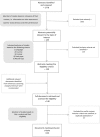Using health technology assessment to assess the value of new medicines: results of a systematic review and expert consultation across eight European countries
- PMID: 28303438
- PMCID: PMC5773640
- DOI: 10.1007/s10198-017-0871-0
Using health technology assessment to assess the value of new medicines: results of a systematic review and expert consultation across eight European countries
Abstract
Background: Although health technology assessment (HTA) systems base their decision making process either on economic evaluations or comparative clinical benefit assessment, a central aim of recent approaches to value measurement, including value based assessment and pricing, points towards the incorporation of supplementary evidence and criteria that capture additional dimensions of value.
Objective: To study the practices, processes and policies of value-assessment for new medicines across eight European countries and the role of HTA beyond economic evaluation and clinical benefit assessment.
Methods: A systematic (peer review and grey) literature review was conducted using an analytical framework examining: (1) 'Responsibilities and structure of HTA agencies'; (2) 'Evidence and evaluation criteria considered in HTAs'; (3) 'Methods and techniques applied in HTAs'; and (4) 'Outcomes and implementation of HTAs'. Study countries were France, Germany, England, Sweden, Italy, Netherlands, Poland and Spain. Evidence from the literature was validated and updated through two rounds of feedback involving primary data collection from national experts.
Results: All countries assess similar types of evidence; however, the specific criteria/endpoints used, their level of provision and requirement, and the way they are incorporated (e.g. explicitly vs. implicitly) varies across countries, with their relative importance remaining generally unknown. Incorporation of additional 'social value judgements' (beyond clinical benefit assessment) and economic evaluation could help explain heterogeneity in coverage recommendations and decision-making.
Conclusion: More comprehensive and systematic assessment procedures characterised by increased transparency, in terms of selection of evaluation criteria, their importance and intensity of use, could lead to more rational evidence-based decision-making, possibly improving efficiency in resource allocation, while also raising public confidence and fairness.
Keywords: European Union; Expert consultation; Health technology assessment (HTA); High cost medicines; Innovative medicines; Pharmaceutical policy; Systematic review; Value assessment.
Figures
References
-
- Weinstein, M.C., Torrance, G., McGuire, A.: QALYs: the basics. Value Health 12(Supplement s1), s5–s9 (2009) - PubMed
-
- Wouters OJ, Naci H, Samani NJ. QALYs in cost-effectiveness analysis: an overview for cardiologists. Heart (British Cardiac Society) 2015;101(23):1868–1873. - PubMed
-
- Runge, C.: Separating the wheat from the chaff. Eur. J. Health Econ. 13, 121 (2012). doi:10.1007/s10198-011-0375-2 - PubMed
Publication types
MeSH terms
Grants and funding
LinkOut - more resources
Full Text Sources
Other Literature Sources



